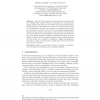Free Online Productivity Tools
i2Speak
i2Symbol
i2OCR
iTex2Img
iWeb2Print
iWeb2Shot
i2Type
iPdf2Split
iPdf2Merge
i2Bopomofo
i2Arabic
i2Style
i2Image
i2PDF
iLatex2Rtf
Sci2ools
112
click to vote
WAC
2004
Springer
2004
Springer
A Metabolic Approach to Protocol Resilience
The goal of this research is to create robust execution circuits for communication software which can distribute over a network and which continues to provide its service despite parts of the implementation being knocked out. Like packets that can be lost (which can be recovered by the appropriate protocols) we envisage an environment where parts of a protocol’s execution can be lost. The remaining implementation elements should continue to operate and be able to recover by themselves for restoring full services again. Based on a chemical execution model, we show a few initial examples of packet processing functions that are robust against the knock-out of any single instruction. These examples illustrate how the model can be applied to implement resilient communication protocols, to which we add regulatory signals that can be used to steer the protocols’ code basis.
Related Content
| Added | 02 Jul 2010 |
| Updated | 02 Jul 2010 |
| Type | Conference |
| Year | 2004 |
| Where | WAC |
| Authors | Christian F. Tschudin, Lidia Yamamoto |
Comments (0)

